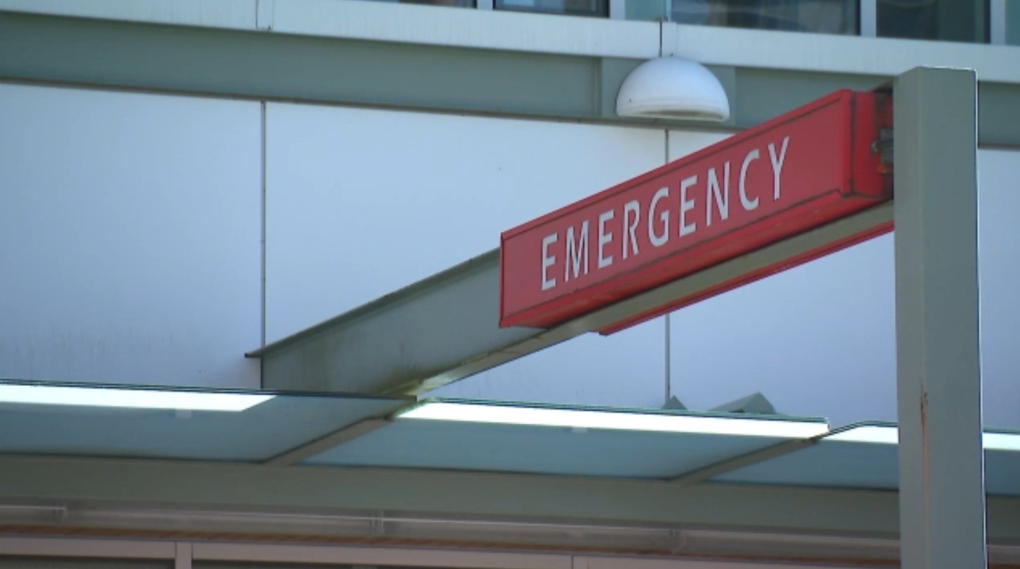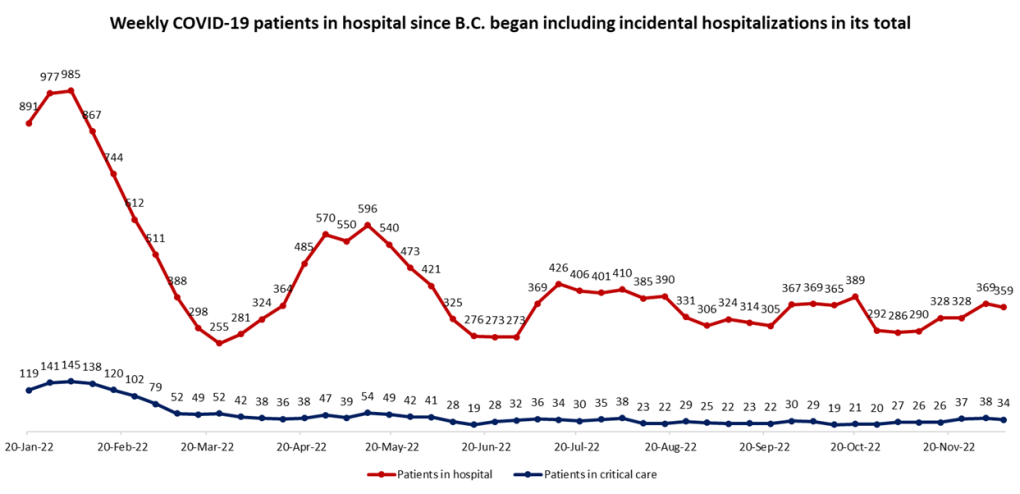Number hospitalized with COVID-19 in B.C. falls slightly in weekly update

The number of people with COVID-19 in B.C. hospitals declined slightly over the last week, as health-care facilities struggled to cope with other illnesses, particularly among children.
The latest data from the B.C. Centre for Disease Control shows 359 test-positive COVID-19 patients in B.C. hospitals as of Thursday. That's down from 369 reported last week on Friday.
 The number of people in hospital with COVID-19 in B.C. on Thursdays since the province switched to a "hospital census" model is shown. (CTV)
The number of people in hospital with COVID-19 in B.C. on Thursdays since the province switched to a "hospital census" model is shown. (CTV)
The hospitalization numbers shown in the graph reflect the number of patients in hospital on Thursday since the province switched to a "hospital census" model in January. Under this model, anyone who tests positive for the coronavirus is included in the hospital count, regardless of whether SARS-CoV-2 is the underlying reason for their hospitalization.
Health officials have estimated that between 40 and 50 per cent of reported hospitalizations are caused by COVID, while the rest are incidental.
Since the province began counting hospitalizations in this way, the total has been as high as 985 and as low as 255, though it hasn't been above 400 since August.
OTHER WEEKLY NUMBERS
The numbers of new cases and new hospital admissions (a separate metric from the hospital census) each also decreased in the BCCDC's latest report, relative to the previous period.
There were 539 new, lab-confirmed cases of COVID-19 detected in B.C. from Nov. 27 to Dec. 3, the most recent full "epidemiological week." That's down from 604 during the preceding epidemiological week.
New hospital admissions also declined slightly during the week ending Dec. 3. There were 140 such admissions during the week, down from 161 initially reported the week before.
Hospital admission numbers are considered incomplete when the BCCDC first releases them. They are typically revised upwards in the following week's report. The 161 new admissions initially reported for the week of Nov. 20 to 26 have since been revised up to 213.
The 140 new admissions reported this week for the period ending Dec. 3 will also be revised upward, but is starting from a lower point than the previous week's total did.
While lab-confirmed case counts aren't subject to this pattern of weekly revision, they do come with a number of caveats.
Specifically, the BCCDC only reports the results of positive PCR tests, and only the first time someone tests positive. A person who had COVID-19 in 2020, when lab-based testing was more widely available, recovered, and then tested positive on a PCR test again this year, would not be included in the weekly case count.
The BCCDC has said it's working to "better quantify" reinfections in its data, but hasn't provided a timetable for doing so.
Similarly, the vast majority of people who have COVID-19 in B.C. are not included in the official count each week, because they do not qualify for PCR tests under the province's current testing strategy.
The independent B.C. COVID-19 Modelling Group estimates that case counts are off by roughly 100-fold, meaning the 539 new, lab-confirmed cases during the week of Nov. 27 to Dec. 3 equate to approximately 53,900, or about 7,700 per day.
COVID VACCINATION SLOWING DOWN AMID FLU 'BLITZ'
While hospitalization data shows that COVID-19 remains a steady presence in B.C.'s health-care system, the disease has featured less prominently in public statements from B.C. health officials in recent weeks, with the focus shifting to the spread of influenza among children.
This flu season has already had some alarming consequences in B.C. Earlier this week, CTV News confirmed six children had died of influenza over a two-week period.
Typically, there are only five or six child deaths from influenza recorded annually across the entire country.
Respiratory illness among children, generally, has strained hospitals for weeks, with doctors at Surrey Memorial Hospital reporting that they've been seeing quadruple the number of patients for which their pediatric emergency department was designed.
Over the weekend, BC Children's Hospital was briefly under a "code orange," a designation typically reserved for natural disasters and mass casualty events.
Against this backdrop, health officials announced a "vaccine blitz" earlier this week. They are reaching out to parents of children under age five to encourage them to get their children vaccinated against influenza, and have expanded walk-in hours at vaccine clinics around the province.
Vaccination efforts against COVID-19, meanwhile, appear to be slowing down. The province administered a total of 79,646 new doses of COVID vaccines during the week that ended Dec. 3, the lowest weekly total since bivalent vaccines became widely available in September.
Most of those doses are classified on the BCCDC COVID-19 dashboard as either fourth (32,909) or fifth doses (23,401), meaning the recipients had already received at least one booster shot after their initial course of vaccine.
CTVNews.ca Top Stories

Doctors say capital gains tax changes will jeopardize their retirement. Is that true?
The Canadian Medical Association asserts the Liberals' proposed changes to capital gains taxation will put doctors' retirement savings in jeopardy, but some financial experts insist incorporated professionals are not as doomed as they say they are.
Something in the water? Canadian family latest to spot elusive 'Loch Ness Monster'
For centuries, people have wondered what, if anything, might be lurking beneath the surface of Loch Ness in Scotland. When Canadian couple Parry Malm and Shannon Wiseman visited the Scottish highlands earlier this month with their two children, they didn’t expect to become part of the mystery.
Fair in Ontario, flurries in Labrador: Weather systems make for an erratic spring
It's no secret that spring can be a tumultuous time for Canadian weather, and as an unseasonably mild El Nino winter gives way to summer, there's bound to be a few swings in temperature that seem out of the ordinary. From Ontario to the Atlantic, though, this week is about to feel a little erratic.
What do weight loss drugs mean for a diet industry built on eating less and exercising more?
Recent injected drugs like Wegovy and its predecessor, the diabetes medication Ozempic, are reshaping the health and fitness industries.
He replaced Mickey Mantle. Now baseball's oldest living major leaguer is turning 100
The oldest living former major leaguer, Art Schallock turns 100 on Thursday and is being celebrated in the Bay Area and beyond as the milestone approaches.
What a urologist wants you to know about male infertility
When opposite sex couples are trying and failing to get pregnant, the attention often focuses on the woman. That’s not always the case.
'It was instant karma': Viral video captures failed theft attempt in Nanaimo, B.C.
Mounties in Nanaimo, B.C., say two late-night revellers are lucky their allegedly drunken antics weren't reported to police after security cameras captured the men trying to steal a heavy sign from a downtown business.
Bank of Canada officials split on when to start cutting interest rates
Members of the Bank of Canada's governing council were split on how long the central bank should wait before it starts cutting interest rates when they met earlier this month.
Made-in-Newfoundland vodka claims top prize at worldwide competition
A Newfoundland-made vodka has been named one of the world’s best by judges at this year’s World Vodka Awards.































